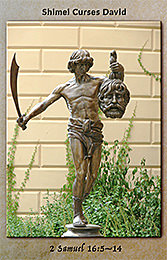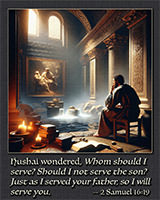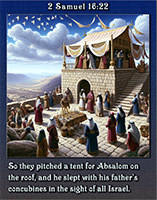2 Samuel 16:1–23 . . . Bible Study Summary with Videos and Questions
“Refreshment, Cursing, and Advice”
David is about to meet with Ziba (vv. 1–4), the first of two men with links to the house of Saul (the other is Shimei [vv. 5–14]). Although Ziba will attempt to ingratiate himself to him and Shimei curses him, David treats each with courtesy. The brief account of the king’s kindness to Ziba has obvious connections with the narrative of his kindness to Mephibosheth (as revealed in our summary of 2 Sam. 9:1–13).
In a nut’s shell, we’ll see in today’s reading and discussion that a man named Shimei will throw stones at David and curse him. In response, Abishai (Joab’s brother and one of David’s military leaders) will ask David to let him kill Shimei, but David won’t let him, claiming that Yahweh must have made Shimei act that way. We’ll also see advisor Ahithophel tell Absalom to have sexual relations with all of David’s ten concubines, on the palace roof, thereby causing the whole nation to see his contempt for King David.
[Note: Click the link to This Week’s Passage near the bottom of this page to read today’s Scripture.]
Ziba: A Kind Man (2 Samuel 16:1–4)
David and his followers have just passed the summit of the Mount of Olives. We first met Ziba in 2 Samuel 9. While David was trying to “get out of town,” someone wanted to see him: Ziba, Mephibosheth’s steward, Jonathan’s sole surviving son, to whom David had granted a permanent place at his table, and all of Saul’s property. Mephibosheth wasn’t present, but Ziba had come to provide David with provisions for his journey ahead: “a string of donkeys saddled and loaded with two hundred loaves of bread, a hundred cakes of raisins, a hundred cakes of figs and a skin of wine” (v. 1b, enlarge image right). At a time of great need, Ziba generously provided David with essential supplies. When David asked Ziba why he’d brought them, he said that they were for the king and those with him, since the wilderness journey ahead would prove difficult.
David welcomed that treat as he prepared to flee unprepared into the wilderness. Ziba had been busy, probably putting together supplies from the harvest of Mephibosheth's lands that Ziba had been managing. When David asked where Mephibosheth was, Ziba told him that Mephibosheth had gone to Jerusalem, hoping that his father’s kingdom (Saul’s) would be restored to him.
Ziba lied to David, which will be revealed in 19:24–30. In fact, Ziba left Mephibosheth behind to make it look like Mephibosheth didn’t support David. He claimed that Mephibosheth had become disloyal, staying in Jerusalem, hoping to regain his throne. On the basis of Ziba’s account, David gave to Ziba and his sons all that had initially been given to Mephibosheth.
A closer look at Ziba David, acting on the only information at hand, assumed that Ziba had told the truth. He was hurt by Ziba’s report that falsely accounted for Mephibosheth’s reaction to the news that Absalom had rebelled. Perhaps Ziba believed that Absalom would kill his master, and he’d eventually be rewarded. David didn’t question Ziba’s account further; he loyally granted all of Mephibosheth’s lands to Ziba and continued on his journey. That was exactly the response Ziba wanted. But David accepted Ziba’s report too quickly without getting all the facts, perhaps because Ziba showed himself to be David’s friend by sustaining him in his flight. We sometimes accept a friend’s analysis of the motives of another person too quickly because we don’t bother to get all the facts. Here, David slipped because he too willingly accepted the complimentary words of a friend. As we’ll see later, David may have acted prematurely: Ziba may well have slandered Mephibosheth for personal gain (cf. 19:24–30). He’s an example of someone who wickedly uses a crisis for his own benefit.
David: Cursed and Stoned (vv. 5–14)
Shimei, the second descendant of Saul, demonstrated a reaction to David that was the opposite of Ziba’s. Ziba had been ingratiating and submissive, but Shimei, who was insulting and defiant, became a cursing critic.
When David reached the village of Bahurim, on the outskirts of Jerusalem, not far away from the Kidron Valley, he was suddenly assaulted by stones, dirt clods, and curses, all thrown at him from a distance, from a man named Shimei, a Benjamite, who was casting blame on King David. We’ll see, in next week’s summary, that this was the same village in which two spies, Ahimaaz and Jonathan, were hidden in a well until Absalom’s men gave up their search for them (17:17–20). In today’s passage, Shimei appears, not to mourn with David or provide supplies for his journey, but to mock and curse him, throwing dirt and stones at him and those with him.
Shimei’s accusations are interesting. But look at his words carefully. He accused David of being a “murderer” and “scoundrel” (v. 7), which was true. We immediately think in terms of Uriah and his murderous death, ordered by David himself. But that’s not what Shimei mentioned specifically. He spoke of David’s shedding of blood in terms of “Saul’s household” (v. 8), meaning that David was responsible for the murders of Abner and Ish-Bosheth, which wasn’t true. Seemingly, Shimei was also entirely out of line by calling David (albeit God’s anointed king) such names while accusing him of the blood of Saul and his family, for which he had no responsibility. David’s hands are clean here, but Shimei couldn’t be reasoned with and wouldn’t be silenced.
Abishai wanted to shut Shimei’s mouth permanently, by cutting off his head, since it was a crime to curse the ruler of God’s people (Exodus 22:28). But David wouldn’t permit that, convinced of the sovereignty of God in such matters. Interestingly, David knew that Shimei’s actions were wrong and that his accusations were inaccurate. Nevertheless, David believed that God might be speaking to him through this man; thus, he wouldn’t seek to silence someone through whom God might be speaking, and he didn’t want to put himself in the place of opposing God. He appears to have felt that his present distress might be God’s punishment for having killed Uriah (vv. 10–11). He hoped that, by showing Shimei mercy, God might be merciful to him (v. 12). Instead, he proceeded on his way, looking to God for his vindication. Weary no doubt from the physical aspects of this trek, but also from the emotionally draining elements of this whole journey, David and his supporters arrived at the destination where they awaited further word from Jerusalem. Again, take note of David’s trust in God’s mercy by reading this verse.
“It may be that the Lord will look upon my misery and restore to me his covenant blessing instead of his curse today” (2 Sam. 16:12).
So, Shimei kept cursing and pelting David with rocks and dirt until David was out of range. David took such abuse with humility. He sensed being repentant while realizing that his arrogance had left him. Finally, we read that, . . .
The king and all the people with him arrived at their destination exhausted. And there he refreshed himself (2 Sam. 16:14).
According to Dr. Ralph F Wilson, “The exiles have pushed hard and reached the fords of the Jordan near Gilgal, a descent of about 3,700 feet, from Jerusalem to the Jordan River. It is a journey of 20 miles on foot (for most of the party) — an exhausting trip, since all you could expect from such a traveling caravan of women and children, plus soldiers and courtiers and the old king, would normally be 10 miles a day. But they are running for their lives. They constitute the government in exile. If captured, most of them would be killed. They have pushed very hard, and now feel they can relax a bit.”
Here, in contrast to previous passages, David succeeded. He didn’t permit someone’s criticism to elicit an improper response from him; rather, he listened for God’s voice in Shimei’s words (vv. 10–11). Sometimes, complimentary words of a friend (vv. 1–4) are more difficult to handle than the curses of an enemy. David demonstrated “growth” here; previously he’d reacted violently to the disdain of an enemy, namely, Nabal (cf. 1 Sam. 25:26, 32–34). For David to have controlled his temper was a greater victory than his slaying Goliath (Proverb 16:32). Times of stress can bring out the best and worst in people. This was true of David’s flight from Absalom, just as it was during his flight from Saul. Thankfully we see in David a radiant illustration of how a deep and inward peace is given to any man who lives in fellowship with God in motive and desire.
Absalom: Advised by Counselors (vv. 15–19)
We’re at the central unit of chapters 5–20, focusing on this judgment: Hushai’s advice was better than Ahithophel’s (17:14). This advice is the pivot on which the fortunes of David turned, in his dealings with Absalom. While David’s loyalists were leaving the city, Absalom and his army (“all the men of Israel”) were entering it. Hushai, David’s confidant, went to Absalom as a “friend of the king” to greet him with the words, “Long live the king! Long live the king!” Most interestingly, Hushai neglected to clarify to which of the two kings he wished long life.
Hushai wanted to leave with David and support him (15:32–34). However, David thought it better to send him back to Absalom, to spy on him and feed him bad advice. Hushai’s bad advice was thought necessary because Ahithophel had become aligned with Absalom, and Ahithophel was famous for his wise counsel. So David wanted someone on the inside of Absalom’s leadership team to frustrate and compromise Ahithophel’s counsel. Clearly, when Hushai said in v. 19, “Furthermore, whom should I serve? Should I not serve the son? Just as I served your father, so I will serve you,” he lied to Absalom, concealing his motives, in the same way that any good spy today hides his true intentions.
Hushai was loyal to David primarily because David, the Lord’s anointed, was “chosen by the Lord” (v. 18). His words to Absalom implied that he was supporting the revolution, but everything that Hushai said could have been taken as supporting David, which he actually did. They are masterful double entendres. He was really serving David in the presence of his son Absalom (v. 19).
It’s evident that Hushai truly served the reigning, God-appointed king. Absalom wasn’t so sure. He was happy to receive Hushai’s supporting overture, but he wouldn’t include him in his war council so Hushai left that king’s chambers.
Absalom: Follows Ahithophel’s Advice (vv. 20–23)
Now that Absalom was in the city, he turned to Ahithophel for advice, suggesting that he do something so offensive that it would eliminate any possible reconciliation with David. Ahithophel believed that his strong advisory would, when followed, give courage to Absalom’s followers so they could follow him in a most-hearty way. In the ancient world, taking a king’s concubines wasn’t only an act of immorality, it was an act of treason, according to the Torah: “If a man sleeps with his father’s wife, he has dishonored his father. Both the man and the woman must be put to death; their blood will be on their own heads” (Leviticus 20:11). Such an act was designed to enable Absalom to not only replace his father, King David, but to completely repudiate him.
You might be wondering: Why did Ahithophel give such radical advice to Absalom? Supposedly, it made sense so as to further his own interests. After all, Ahithophel had the most to lose if Absalom failed to keep the throne or if David and Absalom reconciled. He’d have been revealed as a traitor and ousted in one way or another.
“So they pitched a tent for Absalom on the roof, and he slept with his father’s concubines in the sight of all Israel” (v. 22). That tent was pitched publicly — possibly on the same rooftop from which David had ogled Bathsheba — and word was spread regarding the significance of Absalom’s acts of domination. By taking David’s ten concubines, Absalom showed his supporters that he’d never be reconciled to David, and so strengthened their commitment to him.
Such disgraceful acts say a lot about Absalom, who actually followed Ahithophel’s radical advice. And it also says a lot about Ahithophel, who must have had a strange sense of satisfaction in seeing David’s women violated in a similar way to how his granddaughter, Bathsheba, had been violated by David. This shows the power of bitterness: Ahithophel was willing to see: (1) those women abused in full view, (2) Absalom agree to sin grievously, and (3) the kingdom of Israel suffer greatly, simply as a result of his wanting to satisfy his longing for bitter revenge.
This disgraceful incident also shows that God kept his promise to David. It was a direct fulfillment of Nathan’s prophecy of judgment upon David. . .
11“This is what the Lord says: ‘Out of your own household I am going to bring calamity on you before your very eyes I will take your wives and give them to one who is close to you, and he will sleep with your wives in broad daylight.12You did it in secret, but I will do this thing in broad daylight before all Israel’” (2 Sam. 12:11–12).
“Now in those days the advice Ahithophel gave was like that of one who inquires of God.” Ahithophel had a well-deserved reputation for giving counsel almost as good as God. But in this case his counsel was foolish and destructive because it was motivated by bitterness, which has the power to sour our best qualities. Strangely, Absalom thought he could establish his kingdom directly through immorality. He was a clever and skilled politician, but obviously ignorant about God’s ways.
David: In Retrospect
When we look at David’s response to these events during the darkest hours of his life, we ought to see a few qualities that were lacking elsewhere. Here, we see in David a brokenness and a humility that hasn’t always been evident in his successes. The “David” who was so eager to kill Nabal and all his male servants for being rude to him (1 Sam. 25) was now willing to endure the personal attack and insults of Shimei, because he knew that there was an element of truth in what his enemy had alleged in his cursing. David was willing to learn from an enemy and patiently endure persecution and affliction.
In many ways, David’s suffering provides us with a prototype of the suffering of our Lord Jesus Christ. It’s difficult to read today’s text without thinking of our Lord’s rejection by his own people, the Jews, and of his acceptance by numerous non-Jewish Gentiles. It’s easy to see Absalom’s betrayal of his father and king as a prototype of the betrayal of our Lord by Judas. As David and a procession made their way out of the city of Jerusalem and up the ascent of the Mount of Olives, it’s easy to recall the procession that left Jerusalem, making their way to the cross of Calvary at Golgotha. In the midst of the sadness and sorrow of our text, there’s the foreshadowing of hope that comes from the work of our Lord on Calvary’s cross. Just as David was rejected as Israel’s king, only to defeat his enemies and to return once again as the King of Israel, so our Lord will return to subdue his enemies and establish his eternal throne on his earth. May our hope and trust be in the Son of David, who came to save sinners and establish his righteous kingdom upon this planet.
† Summary of 2 Samuel 16:1–23
This passage continues the account of David’s flight from Jerusalem during Absalom’s rebellion, revealing acts of loyalty, betrayal, and divine providence in the midst of political turmoil. As David proceeds, he meets Ziba, servant of Mephibosheth, who brings donkeys, food, and wine as provisions for the king and his household (16:1–2). Ziba claims Mephibosheth has stayed in Jerusalem, hoping to regain Saul’s kingdom, prompting David to transfer all of Mephibosheth’s property to Ziba (vv. 3–4). Continuing on, David is confronted by Shimei, from the house of Saul, who curses him bitterly, accusing him of bloodshed and rejoicing in Absalom’s takeover (vv. 5–8). Although Abishai offers to kill Shimei, David forbids it, submitting to the possibility that the Lord has sent this cursing and trusting God to repay him with good for his suffering (vv. 9–12). David and his company then continue their journey, weary and humbled (v. 13–14).
Meanwhile, Absalom enters Jerusalem with Ahithophel, David’s former counselor, and is soon joined by Hushai the Archite, whom David had sent back as a covert ally (vv. 15–16). When Absalom questions Hushai’s loyalty, Hushai skillfully pledges to serve “the one chosen by the Lord, the people, and all Israel,” thereby gaining Absalom’s trust (vv. 17–19). Ahithophel advises Absalom to publicly sleep with David’s concubines left in the palace, a move designed to display complete break from David and strengthen Absalom’s position before Israel (vv. 20–21). Absalom follows this counsel, pitching a tent on the palace rooftop and committing this act in the sight of all Israel (v. 22). The chapter concludes by noting the high esteem for Ahithophel’s counsel, which was regarded as if one had inquired from God himself (v. 23). This sets the stage for the coming clash between David’s loyalists and Absalom’s growing rebellion.
Key points with verse references:
• Ziba meets King David with a tremendous amount of supplies, while claiming that Mephibosheth stayed in Jerusalem to seek restoration of Saul’s kingdom, leading David to give Mephibosheth’s property to Ziba (vv. 1–4).
• Shimei, who is loyal to the house of Saul, curses King David, accusing him of bloodshed, but David refuses to retaliate, all the more accepting the possibility that Father God sent him to curse and stone David (vv. 5–12).
• Absalom arrives in Jerusalem with Ahithophel, and Hushai greets him, skillfully assuring Absalom of his loyalty while secretly serving David (vv. 15–19).
• Ahithophel advises Absalom to sleep publicly with David’s concubines to display his full break from David and strengthen his claim (vv. 20–21).
• Absalom follows Ahithophel’s counsel, committing the act on the palace rooftop, and Ahithophel’s advice is seen as having divine authority (vv. 22–23).
This Week’s Passage
2 Samuel 16:1–23
New International Version (NIV) [View it in a different version by clicking here; also listen to chapter 16 narrated by Max McLean.]
Summary Video: “The Second Book of Samuel”
† Watch this introductory video clip created by BibleProject on bibleproject.com.
- Q. 1 Why didn’t David silence Shimei’s cursing him?
- Q. 2 Was that a political decision or a spiritual decision?
- Q. 3 What does David’s decision tell you about his faith?





